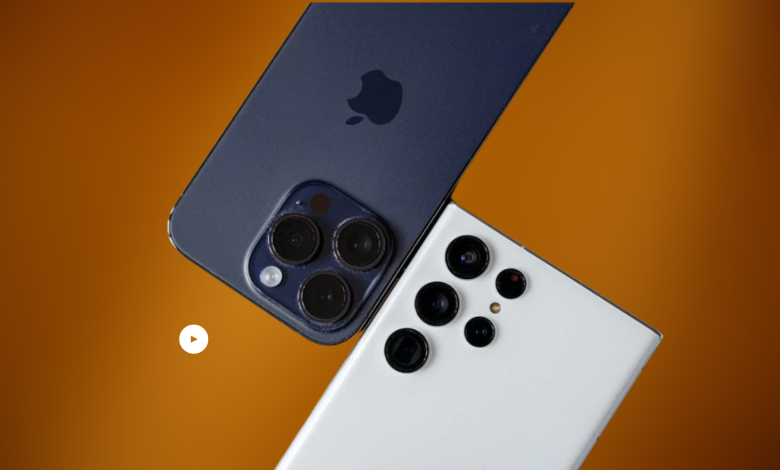
Smartphones are dominated by two giants, Apple’s iconic iPhone and Samsung’s revolutionary Galaxy series. In order to navigate between these behemoths, careful consideration is necessary, as each offers a variety of distinctive features and immersive experiences. Let us conduct a thorough comparison in order to assist you in making a well-informed decision.
History of iPhone and Samsung
In 2007, Apple’s luminary co-founder Steve Jobs introduced a paradigm-shattering innovation in the world of telecommunications that revolutionized the industry. Jobs’ vision was to create a device that integrated communication, entertainment, and productivity seamlessly. On June 29, 2007, the iPhone debuted, captivating global audiences with its groundbreaking touchscreen interface and cutting-edge aesthetics. This momentous occasion marked more than just the launch of a product; it marked the beginning of the modern smartphone era.
Samsung, one of the world’s largest technology conglomerates, traces its roots back to March 1, 1938, when a young entrepreneur named Lee Byung-chul established a small trading company in Daegu, Korea. Initially, the company focused on exporting groceries such as dried fish, locally-grown groceries, and noodles to China.
Through its evolution, Samsung has ventured into a wide range of industries, including textiles, insurance, and securities, as well as retail. Samsung did not embark on its electrifying journey into the electronic world until the late 1960s.
Key Differences Between iPhone or Samsung
Operating Systems
Certainly! One of the most notable differences between iPhones and Samsung devices lies in their operating systems. iPhones utilize iOS, whereas Samsung devices run on Android. iOS is renowned for its polished interface and effortless synchronization with other Apple products, whereas Android provides users with extensive customization possibilities.
Design and Build Quality
Apple is well-known for its premium design and high-quality construction, with iPhones often showcasing sleek aluminum or glass exteriors.. Samsung devices, on the other hand, often sport plastic or metal frames with glass backs. Both offer durability, but Apple’s attention to detail sets it apart in terms of aesthetics.
Camera Quality
Both iPhone and Samsung smartphones are celebrated for their remarkable camera capabilities. iPhones are particularly praised for their advanced image processing algorithms, which result in vibrant colors and crisp details in photos.Samsung devices, on the other hand, excel in low-light photography and offer a range of shooting modes for creative flexibility.
Performance
In terms of performance, both iPhone and Samsung devices offer powerful hardware and smooth user experiences. iPhones are optimized to work seamlessly with iOS, resulting in faster app loading times and smoother multitasking. Samsung devices, meanwhile, often feature cutting-edge processors and ample RAM for snappy performance.
Ecosystem
Apple has built a robust ecosystem around its products, allowing seamless integration between iPhones, iPads, Macs, and other Apple devices. This ecosystem includes services like iCloud, iMessage, and Apple Music, enhancing the overall user experience. Samsung offers a similar ecosystem with its Galaxy devices and services like Samsung DeX and Samsung Pay.
Pros and Cons of iPhone
Pros
Seamless integration with other Apple products
Regular software updates and security patches
High-quality camera performance
Cons
Limited customization options
Higher price points compared to some Android devices
Dependency on proprietary accessories and services
Pros and Cons of Samsung
Pros
Wide range of devices catering to different budgets and preferences
Extensive customization options with Android
Innovative features like multi-window multitasking and S Pen support
Cons
Inconsistent software updates across devices
Bloatware and duplicate apps pre-installed on some devices
Less seamless integration with non-Samsung products
Pricing Comparison
When it comes to pricing, iPhones tend to be more expensive upfront compared to Samsung devices. However, Samsung offers a wider range of devices catering to different budget segments, allowing consumers to find a device that fits their financial constraints.
User Experience Comparison
When it comes to user experience, both iPhone and Samsung devices provide intuitive interfaces and seamless performance. Ultimately, the decision depends on individual preferences and compatibility with the ecosystem.
Conclusion
Choosing between iPhone and Samsung boils down to individual preferences and priorities. Whether you prioritize seamless integration with other Apple products or crave the customization options of Android, both brands offer compelling options to suit your needs.
FAQs
Which brand has better resale value: iPhone or Samsung?
Generally, iPhones tend to retain their value better than Samsung devices due to their perceived prestige and longevity.
Do iPhones or Samsung devices have better battery life?
Battery life varies depending on the model and usage patterns, but both brands offer devices with long-lasting batteries and fast charging capabilities.
Are iPhones more secure than Samsung devices?
While both iPhone and Samsung devices boast robust security features, the perception often leans towards iPhones being more secure. This inclination stems from Apple’s meticulous oversight of both hardware and software aspects.
Do Samsung devices offer better multitasking capabilities than iPhones?
Samsung devices, particularly those in the Galaxy Note series, offer advanced multitasking features like split-screen and multi-window support, giving them an edge in productivity.
Which brand offers better customer support: Apple or Samsung?
Apple is renowned for its customer service and support, offering in-person assistance at Apple Stores and prompt responses to queries through various channels.





2 Comments